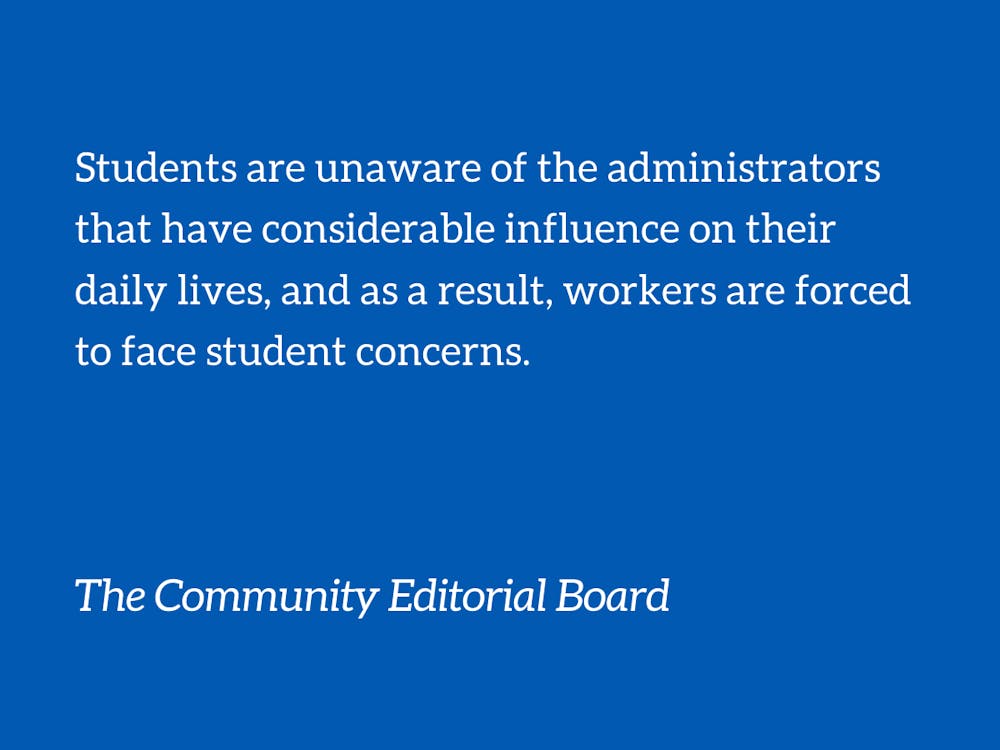Many of us think of Duke as simply an educational institution. It’s perhaps even one of the most prestigious universities in the country, with some of the most elite academic programs and coveted opportunities. However, to Durham County, Duke is more than a place for students to advance their education. Duke is the largest employer in the county and the fourth-largest private employer in North Carolina. The University has even been referred to as “the city of Duke”, with nearly 35,000 employees–ranging from nurses to plumbers– making the community larger than the towns of Carrboro and Wake Forest in North Carolina. These workers can be seen throughout campus, even more visible than most members of the administration. So, when a bus is late or food is lagging on mobile order, why are we so quick to point a finger at the people responsible for our luxurious quality of life on campus?
Staff members are integral to life and education at Duke. These workers keep our residential areas, lecture halls, and labs clean. They provide students with food through mobile and in-person ordering and organize student mail. They maintain Duke’s gorgeous campus, handling landscaping across the campus’ many outdoor spaces.
Duke staff were particularly integral to Duke’s successful reopening during the pandemic, allowing a faster return to normal for the student body compared to Duke’s peer institutions. Dining workers delivered food from WU to the front of our dorms so that we could remain safely inside, and facilities workers diligently sanitized common spaces across campus so students could have safe spaces to interact amidst the pandemic. Duke staff have shown their commitment and success in meeting student needs despite budget cuts, worker shortages and denial of hazard pay during the COVID-19 pandemic. Duke’s services are by no means perfect, but they are being executed by hard-working staff.
Duke’s bus system is an example of an essential service that has garnered disapproval from students. Admittedly, the bus system has much room for improvement. However, students often direct their frustrations towards the wrong people. When a late C1 makes students late for class, animosity flares towards the driver. The reality is, bus drivers have little say in how many buses run on each route, what the bus routes are, when buses start or stop or whether students have to wear masks on the bus. Nevertheless, bus drivers often bear the burden of these complaints instead of administrators who have jurisdiction over these matters, such as Duke Parking and Transportation director Carl DePinto. This pattern goes beyond Duke’s bus system, extending into nearly every Duke service. Workers often face the repercussions of the decisions and actions of administrators.
A peek behind the curtain reveals that this disconnect between workers and students begins with the rift between administrators and students. Administrators are rarely accessible to the average student, and students are not always knowledgeable about who to go to for the right issue. For example, the distinction between the jurisdictions of offices such as Duke Student Affairs and Undergraduate Education is unclear. Students may know big names on campus, such as Vice Provost Gary Bennett, or Vice Provost Mary Pat McMahon, but many don’t know exactly what they do or how to contact them. This fact is even more true for various services across campus. How many of us know Robert Coffey with Duke Dining, or Miranda McCall, Director of the Karsh Office of Undergraduate Financial Aid Support? Students are unaware of the administrators that have considerable influence on their daily lives, and as a result, workers are forced to face student concerns.
We understand that the Duke Administration is making efforts to improve student life, and this article is not intended to place blame on their shoulders. However, we want to recognize that workers are simply following the instructions of other Duke officials. We know that bus drivers hate having to leave students behind on a crowded 8:20 a.m. bus, but the bus capacity limit is a rule they have to follow, not one they can change. Within their roles as employees, Duke workers may not experience the same freedom to speak out against Duke’s policies that we share as students. As they navigate a global pandemic, job security is likely a larger concern than lobbying administration for different decisions. Exercising our right to criticize administrative policies is important, but it must not be at the expense of those doing the physical work. Don’t be blinded by the system.
We get it. It’s annoying when the C1 makes you late to class. It’s frustrating when something goes wrong with mobile ordering. However, students must be more mindful of the complaints they make, and who they make them to. Duke is full of forward-thinking students, dedicated to promoting equity and acknowledging privilege. Let’s apply these principles to our everyday lives. Duke workers are essential contributors to Duke’s community, and above all else, people deserving of respect. It’s past time that we treat staff with compassion.
Students must be aware of the power dynamics on campus and hold the Duke administration accountable for their decisions as opposed to blaming workers who simply carry out these decisions. Next time you see a staff worker driving the C1, cleaning your dorm, or ringing up a meal, slow down. Say please and thank you. Because the truth is, Duke would be nothing without them.
The Community Editorial Board is independent from the editorial staff of The Chronicle. Their column usually runs on Tuesdays.
Get The Chronicle straight to your inbox
Signup for our weekly newsletter. Cancel at any time.

